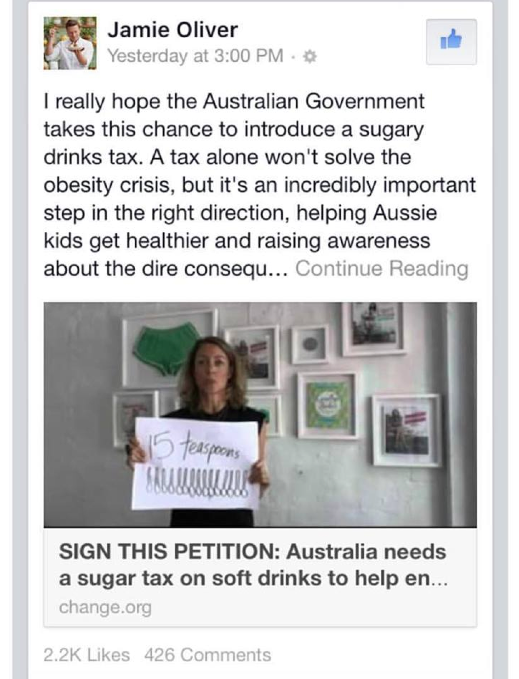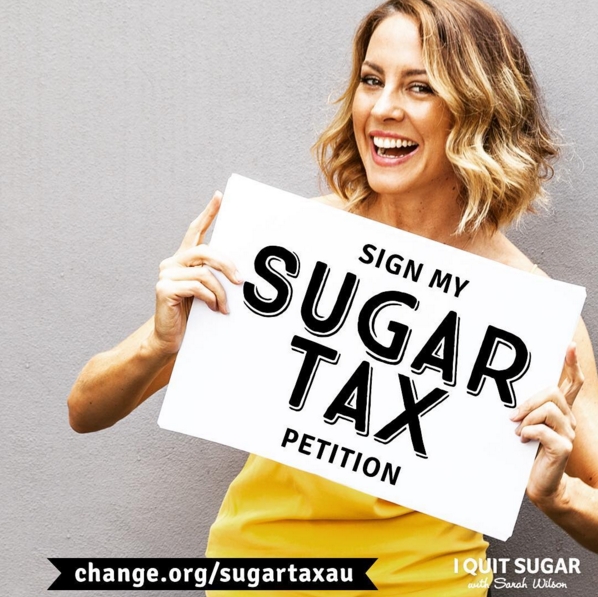I’m going to start this post by saying hats off to Big Soda…they sure do a fine job of spreading misinformation.
Last week the I Quit Sugar team and I launched a huge campaign for an Australian sugar tax on sugar soft drinks.
Click to sign now if you like.
Jamie Oliver did similar in the UK and, with 155,000 signatures, was able to influence UK Parliament to commit to a 20 per cent tax on sugary soft drinks in 2018. The folk behind his campaign – change.org – approached me to do the same here.

We now have 15,000 signatures. And counting.
Click to sign now to add to the tally.
Anyway, I’ve become a little frustrated about the push-back from some to the campaign. I love debate and constructive questioning of anything I do. I’m grateful for it. It keeps me on my toes and committed to getting closer to truth. But I tend to get frustrated when push-back is wedded to the black and white and lazy blanket statements. Or, worse, arguments literally sponsored by Big Food and Big Soda.
Sorry to be grumpy. I’ll get practical now. Here’s a rundown of what I think are sensible answers to some of the pushback floating about.
Consider it an antidote to Big Soda’s magnificent multi-billion dollar effort to shut the debate down.
Consider it my brazen attempt to get you (beg you) to sign’n’share, sign’n’share. We will be doing a roll call of faces and names who’ve got on board, starting with Jamie Oliver, Alexx Stuart, Emma Isaacs, the Obesity Coalition, Lee Holmes and Rough and Bare (thanks Friends!).
1. “All sugary foods should be targeted, not just soft drink.”
True. It’s not the bubbles or the water that makes soft drink so dangerous. It’s the sugar, which is also found in 80-90 per cent of products in supermarkets.
Does this mean we don’t start somewhere? No!
Soft drink is the low-hanging fruit. Few dispute that they are crappy contributions to life. Even Big Soda is having to concede this. It’s a starting point that can get traction.
Plus, liquid sugar is the most dangerous kind. It’s a huge (9 teaspoons-plus for a standard can of soft drink) and fast (due to it being a liquid) dumping to the liver. The liver struggles to deal with such a large and fast injection of the white stuff, and it’s subsequent reaction is what leads to the metabolic disasters we know as diabetes, heart disease, obesity etc.
Add to this:
- Aussie kids 2-16 years, get almost 30 per cent of their daily sugar intake from soft drinks. It’s the perfect place to start this fight.
- The average Aussie kid drinks 1.2 cans of soft drink a day.
I’ll say it again. We have to start somewhere. We can’t afford to put the kibosh on an initiative – possibly the only one that will get up in our lifetime – that could get traction. I mean, really?
2. “Oh, don’t be extreme, everything in moderation.”
Ah yes, the moderation line.
Big Soda likes to use it quite a bit. It’s a great tactic. This conglomeration of vested interests that regularly release illicitly sponsored studies that exonerate their products then, next breath, trawl out the “everything in moderation” argument. They also suggest we can drink their cans of fizzy water with 10 teaspoons of added sugar, but we really need to be burning off those calories with a good run or bike ride. Calories in, calories out, people!
Which would be a super argument if there were a skerrick of science to it. The body doesn’t work this way. We’re a little more complex. Indeed, we are consuming no more calories than we did 70 years ago, doing more exercise, and yet obesity has skyrocketed. Um, at the same rate as our sugar consumption.
No matter. Their equation is lovely and simple and it sticks with the public, especially when they throw hundreds of millions at “educating” us on it. Yes, they call it education.
3. “Another tax??! It should be about personal responsibility.”
Not that boring old chestnut.
Says Coca-Cola’s CEO: “Americans need to be more active and take greater responsibility for their diets.” The American Beverage Association has said similar.
The specifics of sugar’s impact on our health are such that we can’t do “self-control”. Or moderation.
It’s addictive and it’s the only food molecule on the planet that switches off our appetite hormones. That is, we have no “off switch” for sugar. Why so? Back when we had to hunt down our calories, and sugar was a scarcity (a few bitter berries and beehives here and there), it made sense to have a unique capacity to binge on it because, wait for it, sugar is the best source of fat on the planet.
It also made sense to not burn off these sugar calories in their sourcing. That would just be silly. Ergo, so is the “you just need to go for a jog” argument.
Plus it’s force-fed to us by the food industry. Most Australians have no choice about how much sugar they eat because it’s mostly hidden from them.
As I wrote in my op-ed for The Guardian yesterday,
There is absolutely no personal responsibility argument when there’s no choice.
The Guardian covered this off really nicely in another feature last week if you want to do a long read on it.
And we interviewed Dr Aseem Malhotra over at IQuitSugar.com where he echoes my thoughts, concluding: “The personal responsibility argument is complete and utter nonsense.”
As a relevant aside, I really like this line put forward by Sydney Morning Herald economics editor Peter Martin after former treasurer Joe Hockey arked up on Twitter about the UK’s sugar tax.
(Joe Hockey) replied: “Why is your default more tax or more regulations to ‘control’ individual behaviour? How about the idea of personal responsibility?”
Two years earlier, he had had four-fifths of his stomach removed because he had been unable to control what he ate.
Personal responsibility is easy to speak about, hard to practice.
Sugar is one of the reasons.
4. “But sin taxes don’t work!”
Nope, I can’t agree with this, I’m afraid. There is already sufficient evidence that “sin taxes” do reduce consumption. Various studies show a 20 per cent hike in soft drink prices could slash consumption by up to 24 per cent, and case studies in France, Hungary and Mexico show such taxes do impact sales.
Plus, an Australian study last week confirmed this tax in Australia could save more than 1600 lives and raise $400 million a year for health initiatives.
Click to sign now if feeling convinced.
5. “We should be targeting education, not taxing consumers.”
Seriously? You’re going to actually argue we can’t have a tax and continue educating the community?!
I’ve been working on the education side of things for 5 1/2 years. Tirelessly. Trust me, we need government intervention, too.
I’ll also flag:
- We did a survey with thousands of readers to ask what they’d like me to tackle to help them manage sugar in their families. Guess what? A sugar tax – lobbying for government intervention – was number two on the wish list. Ahead of education.
Plus, look what’s happened! This sugar tax debate has got the nation talking…and through this we all get educated. It’s a double boon.
The UK Behavioral Insights team that worked on the UK Sugar Tax campaign says the signalling effect of the sugar tax is just as important as the direct economic effect to consumers. It sends the message sugared drinks are bad for your health and that there are alternatives.
And what’s to say revenue from a sugar tax can’t be used to educate children about nutrition? The UK Government has already pledged to put the tax revenue back into schools.
Why would we put the kibosh on a tax without acknowledging this??
6. “Make healthy food cheaper instead!”
Again, I’d agree with you (and so would the World Health Organization) that we need to also be subsidising real food. I will be suggesting this solution to Scott Morrison when I present the petition – to use the tax to subsidise fresh fruit and veg.
Consider this:
- 85 per cent of Australians support the idea of a soft drink tax if the revenue was used for programs to reduce childhood obesity and encourage children to play sports.
Honestly, we can’t afford to be pushing back on a tax because we think it excludes making healthy food more accessible. That just doesn’t make any sense!!
7. “This is just another tax on the poor.”
Sure, statistically, there is higher soft drink consumption in demographics of socioeconomic disadvantage. So this tax is likely to impact them more, as does any consumption tax. But, flipside, it’s these demographics that need the most help. The poorer the area, the more rampant the sugar advertising (hello, Mexico), and the higher the obesity rates.
I’ve been abused across social media in the wake of my campaign, accused of being elitist, born with a silver spoon in my gob and so on. I don’t feel like defending myself here by explaining nothing is further from the truth. So I won’t. Because it’s got nothing to do with the fact I’m now, in my 40s, in a position to campaign on what matters to me and that I have a responsibility to do so.
Moving on…
It’s also been shown the burden of the tax on consumers is “almost negligible”. A senior research fellow at Monash University Centre for Health Economics told media last week, “Low-income individuals would reduce consumption the most and they would be the most to benefit in terms of weight reduction.”
A coalition of Australian scientists and stakeholders, including Deakin University, The University of Queensland, the Obesity Coalition and the Cancer Council, last week drew on science to show that an Australian sugar tax would prevent 4400 heart attacks and 1100 strokes, and save the health care system $609 million over 25 years.
Deep breath. I’ve said enough for now.
Please do feel free to argue with me on the above points. But please be reasonable, researched and considered. And please do feel free to onpass this post to any skeptics in your orbit.
And please…can I ask you to help me out with this campaign.
It’s simple:
- Sign the I Quit Sugar petition at Change.Org/sugartaxAU.
- Remember to click the button to share on Facebook.
- If you’re an influencer on social media, please share across Instagram, Twitter etc in your own way, or share one of my tiles on my Instagram and highlight the hashtags #sugartaxAU #sugartax and URL Change.Org/sugartaxAU


